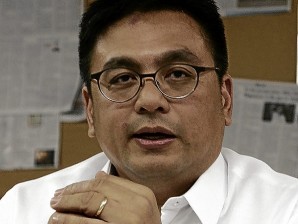Bureau of Customs abolition planned
Believing that any less stringent measure will not suffice to stamp out smuggling, the Aquino administration is considering abolishing the Bureau of Customs and replacing it with a professional institution run by private officials and employees.
Customs Commissioner Rozzano Rufino Biazon said he had an initial discussion with President Benigno Aquino III about a top-down cleansing at the customs bureau that would once and for all end smuggling and corruption in the agency.
“One concept done by other countries is a complete overhaul [of their customs departments] through abolition. We might have to do that,” Biazon said in a roundtable discussion with Inquirer editors and reporters on Thursday night.
The Bureau of Customs has been under fire in recent days, with reports about the rampant smuggling of oil through special economic zones and agricultural products that is costing the government billions of pesos in lost revenues every year.
Critics have demanded the resignation of Biazon for allegedly failing to stamp out smuggling despite the Aquino administration’s emphasis on transparency and good government.
Get rid of them all
Unknown to them, Biazon himself has proposed scrapping the entire customs bureau to get rid of all the corrupt officials and employees in the agency.
Biazon cited the example of Peru, which, to defeat corruption and smuggling, abolished its custom department, put up a new one, adopted strict qualifications for hiring, and paid higher salaries to the new officers and employees running the new agency.
In the case of the Philippines, Biazon said, corruption is deeply entrenched in the customs bureau’s culture and system so firing a few people or catching some smugglers will not solve the problem.
Biazon explained that face-to-face transactions between front-line customs personnel and importers open up opportunities for corruption.
Resistance to reforms
The solution, he said, is to have a completely automated system that will do away with direct dealings between customs employees and importers.
On his watch, he said, the customs employees’ strong opposition to reform makes it difficult for him to clean up the bureau.
Biazon cited an administrative order he issued last year for the automation of one customs procedure. “Concerned customs employees,” citing a threat to their job security, went to court and obtained a restraining order to block the reform.
“Customs reform is not just about chopping off heads. The guys down there in the front lines are the ones who have the power to perpetuate these things (corruption),” Biazon said.
He said the Philippines has been left behind by many countries in customs improvement. In those countries, he said, systems eliminating discretions of customs officers have been implemented to avoid corruption.
Self-financing
Biazon also said that under the proposal being considered by the Aquino administration, the replacement of the customs bureau will not be dependent on the national government for its budget. Instead, it will retain 3 percent of its tax and duty collections to finance its own operations.
That way, Biazon said, the new institution will not have to go to Congress every year to ask for budget approval, thus keeping itself free from the influence of politicians.
“We must insulate customs from politics,” Biazon said.
Moreover, the proposal states that, if possible, the employees of the new organization will be exempted from the Salary Standardization Law. With the exemption, it can pay its employees relatively higher salaries than what regular government agencies pay their staffs.
Giving high salaries is one way of shielding customs officers and employees from temptation, Biazon said.
Private auctions
He said that if he had his way, the customs bureau would no longer hold auctions to dispose of forfeited goods. Having a private group do that job is a prudent idea, he said. It will also defeat the “auction syndicates,” dummies of smugglers who forfeited the goods. With the syndicates being allowed to top the auctions by corrupt customs officers, the smuggled goods go back to the smugglers.
“One of the benefits of this proposal is the expedited disposal of forfeited cargos. Another is the process of auction becomes transparent,” Biazon said.
“If the function is delegated to the private sector, customs would be able to concentrate more on its other vital functions,” he said.
First posted 12:07 am | Saturday, April 13th, 2013















